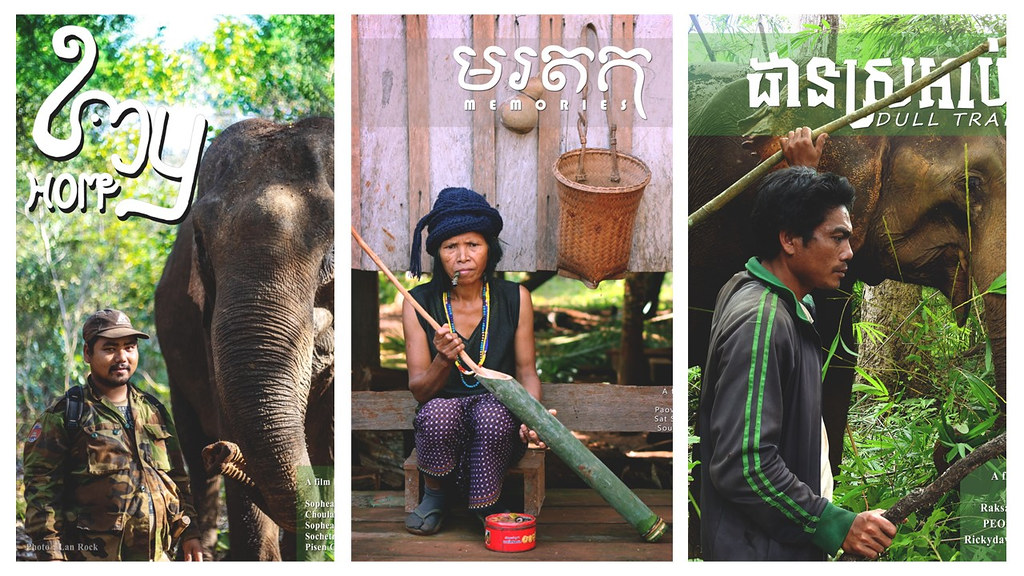Three new documentary films will be screened later this week, each telling a story about the urgent environmental and development challenges facing Cambodia’s wildlife and its indigenous people.
The result of a participatory filmmaking programme led by the University of Bath’s Dr Pete Manning with colleagues in Cambodia, these films bring home powerful messages from young people in the country about deforestation, wildlife reduction and exploitation – with important calls for action.
Cambodia’s forty years of conflict have left a legacy of environmental harms, with severe deforestation seeing the numbers of rare and endangered wildlife, in particular its wild elephant population, declining sharply. Indigenous communities, already marginalised in society, have suffered particularly badly due to development pressures on forests.
Conservation practice around elephant habitats, and issues facing the communities who live alongside them, formed the basis of this work. It also offered a means by which to engage young Cambodians with many of the wider environmental challenges facing the country.
Working with international colleagues, the project saw a group of 12 young Cambodians provided training in film production and editing by project partner the Bophana Centre, and detailed advice about conservation and indigenous issues provided by Cambodian organisation ELIE.
With filming taking place in Modulkiri province in 2020, the three films produced – ‘My Home’, ‘Memories’ and ‘Dull Trailer’ – each explore issues around deforestation, elephant welfare and custodianship in indigenous Bunong communities.
In Cambodia, the films have already been seen by the Secretary of State for Culture and the Environment. Neth Pheaktra, Cambodian Secretary of State for Environment, commented on how the films offer “a message to educate the people to understand how important it is to preserve the forest.”
Dr Pete Manning from Bath’s Centre for the Analysis of Social Policy and Department of Social & Policy Sciences who led the project and whose own work focuses on the connections between human rights, transitional justice, environmental harm and memory, said: “Our hope was that the films would focus on issues around conservation, animal welfare, and problems facing indigenous communities in Modulkiri in way that could speak to broader regional and international environmental challenges.
“The key to amplifying public awareness of these issues, and especially the interconnections of local and international environmental challenges, was centring young people as authors of these stories and as agents of change. The films reflect their priorities and worldviews, the dialogue and relationships with indigenous communities that took place, and the care for natural habitats that was cultivated by the project.
“This makes the films a powerful set of advocacy tools for local audiences, but that can draw further international attention to pressing issues like deforestation in Cambodia.”
Read more from Dr Manning in this blog reflecting on the project
Local partners
Jemma Bullock Program Manager at the Elephant Livelihood Initiative Environment (E.L.I.E) and the Elephant Valley Project Cambodia explained: “We are at a critical point for Asian elephants across the world and we need to act now to conserve this species. In Cambodia alone there are only 70 elephants left in captivity and 400-600 in the wild, a very small number compared to some of the neighbouring countries. Our organisation ELIE and our Elephant Valley Project sanctuary have been working for 15 years to help protect, conserve and increase the welfare for these last remaining elephants of Cambodia. We also support the local indigenous community who look after these last captive elephants and live in the forest on the boundaries of wild elephant's habitat.
“Part of this process is also to bring awareness to the elephant's situation through educational ecotourism programs at the Elephant Valley Sanctuary, including the recent youth-led documentary film project with the Bophana Centre and the University of Bath. Young filmmakers are an excellent medium to be able to share their views on these conservation issues and by undertaking this program can hopefully become advocates for change in the world for elephants. We hope that these films can be viewed by international audiences who can also gain an understanding of the issues for elephants, humans and the forest here in Cambodia as well.”
Choulay Mech, one of the young people involved in this work, reflected: “I learned about this amazing opportunity through my photography teacher who encouraged me to study documentary film at the Bophana Center. Having worked on the Elephant Dream documentary and having now graduated from the Bophana Centre, I’ve won three grants to showcase my work to new audiences and develop my skills and my work in environmental reporting.”
Chea Sopheap, Director of project partner Bophana Audiovisual Resource Center in Cambodia, added: “Using the power of moving image, especially in form of cinematic creation, Bophana Center empower young people by training them in filmmaking and audiovisual creation to facilitate the freedom and artistic expression. Through the project 'Elephant Conservation and Indigenous Experiences', empowered youth explored and revealed the environmental issues, and conservation challenges and cultural practices in the indigenous communities.”
Find out more about Bophana's work.
Watch Trailers
- My Home (Produced by Sopheana CHOUN, Choulay MECH, Sopheak YAM, Sochetra MEAN, Pisen CHHEAN)
- Dull Trail (Produced by Ricky David CHOEY, Mono PEOU, Raksa KHON)
- Memories (Produced by Sonan SOUS, Sreytoch SAT, Theang PAOV)

